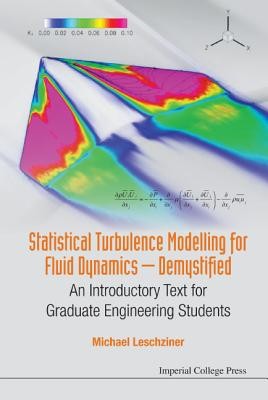
- We will send in 10–14 business days.
- Author: Michael Leschziner
- Publisher: Imperial College Press
- Year: 2015
- Pages: 424
- ISBN-10: 1783266619
- ISBN-13: 9781783266616
- Format: 15 x 22.6 x 1.8 cm, minkšti viršeliai
- Language: English
- SAVE -10% with code: EXTRA
Statistical Turbulence Modelling for Fluid Dynamics - Demystified: An Introductory Text for Graduate Engineering Students (e-book) (used book) | bookbook.eu
Reviews
Description
This book is intended for self-study or as a companion of lectures delivered to post-graduate students on the subject of the computational prediction of complex turbulent flows. There are several books in the extensive literature on turbulence that deal, in statistical terms, with the phenomenon itself, as well its many manifestations in the context of fluid dynamics. Statistical Turbulence Modelling for Fluid Dynamics -- Demystified differs from these and focuses on the physical interpretation of a broad range of mathematical models used to represent the time-averaged effects of turbulence in computational prediction schemes for fluid flow and related transport processes in engineering and the natural environment. It dispenses with complex mathematical manipulations and instead gives physical and phenomenological explanations. This approach allows students to gain a 'feel' for the physical fabric represented by the mathematical structure that describes the effects of turbulence and the models embedded in most of the software currently used in practical fluid-flow predictions, thus counteracting the ill-informed black-box approach to turbulence modelling. This is done by taking readers through the physical arguments underpinning exact concepts, the rationale of approximations of processes that cannot be retained in their exact form, and essential calibration steps to which the resulting models are subjected by reference to theoretically established behaviour of, and experimental data for, key canonical flows.
EXTRA 10 % discount with code: EXTRA
The promotion ends in 22d.21:19:20
The discount code is valid when purchasing from 10 €. Discounts do not stack.
- Author: Michael Leschziner
- Publisher: Imperial College Press
- Year: 2015
- Pages: 424
- ISBN-10: 1783266619
- ISBN-13: 9781783266616
- Format: 15 x 22.6 x 1.8 cm, minkšti viršeliai
- Language: English English
This book is intended for self-study or as a companion of lectures delivered to post-graduate students on the subject of the computational prediction of complex turbulent flows. There are several books in the extensive literature on turbulence that deal, in statistical terms, with the phenomenon itself, as well its many manifestations in the context of fluid dynamics. Statistical Turbulence Modelling for Fluid Dynamics -- Demystified differs from these and focuses on the physical interpretation of a broad range of mathematical models used to represent the time-averaged effects of turbulence in computational prediction schemes for fluid flow and related transport processes in engineering and the natural environment. It dispenses with complex mathematical manipulations and instead gives physical and phenomenological explanations. This approach allows students to gain a 'feel' for the physical fabric represented by the mathematical structure that describes the effects of turbulence and the models embedded in most of the software currently used in practical fluid-flow predictions, thus counteracting the ill-informed black-box approach to turbulence modelling. This is done by taking readers through the physical arguments underpinning exact concepts, the rationale of approximations of processes that cannot be retained in their exact form, and essential calibration steps to which the resulting models are subjected by reference to theoretically established behaviour of, and experimental data for, key canonical flows.


Reviews